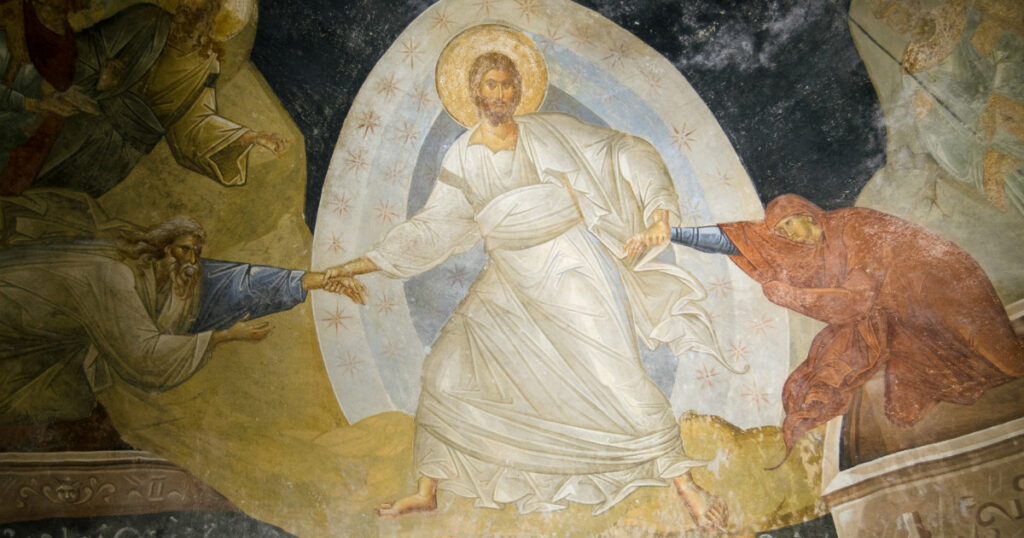by Matthew C. Harrison
There is a near universal human conviction that somehow something of human consciousness lives beyond death, whether a continuation of the human person absent a body, or absorption of the individual consciousness into some “stream of consciousness,” or a higher final state of oneness and being with “god.” Genuine Marxists or Communists are an exception. As “materialists,” they limit all reality to what is material in nature. Thus no soul. No heaven. No afterlife. John Lennon’s ridiculous song “Imagine” spouted, “Imagine there’s no heaven, it’s easy if you try. No hell below us, above us only sky.” Hermann Sasse once quipped about the reigning liberal theology of his youth (ca 1917) that “one can perhaps live with it. But one can’t die with it.”
True biblical and Christian teaching about life and eternal life is much different. It’s a theology of Jesus, our incarnate God, who sacrificed His divine flesh and blood (His body) for the sins of the world. His body died on a wretched cross. His same body rose again on the third day and lives bodily as the God-man into all eternity. And He promises us the very same resurrection.
Christians have always confessed this truth, even in the face of Gnostics and other heretics who have made assertions such as that God the Word jumped into Jesus at His Baptism, and then out of Jesus at His crucifixion, and then back into Jesus at His resurrection. Or that multiple “gods” rule the universe, the ultimate god existing as pure spirit in a purely spiritual realm, while a lesser and evil god created the earth and human beings — and thus the goal of our lives is to get rid of this body, this “shell,” and get back to pure spiritual being.
The Early Church soundly and roundly confessed this theology of the body. “God of God, Light of Light, very God of very God,” our Nicene Creed confesses of Jesus — and then, “[He] was made man.” Luther and company vigorously adopted and championed this very same theology. Want to know God? Look to the flesh and blood of Jesus! Want salvation? Believe that the “blood of Jesus [the man] His Son [God!] cleanses us from all sin” (1 John 1:7). Luther reveled in this Jesus-body reality. Jesus said that His glorification happened precisely at His crucifixion. “The hour has come for the Son of Man to be glorified,” said Jesus” (John 12:23). It was the dirtiest, bloodiest, ugliest display in history when the blessed Savior hung dead on the cross. Yet this was the hour Jesus spoke about. And how glorious for us: “For our sake He made Him to be sin who knew no sin, so that in Him we might become the righteousness of God” (2 Cor. 5:21). For He took Himself up again and was “raised for our justification” (Rom. 4:25).
The world and our first parents, Adam and Eve, were created sinless. Their rebellion sent the world into a death spiral. The remedy was provided by God Himself. “He is the propitiation [atoning sacrifice] for our sins” (1 John 2:2). And this has huge ramifications for all of life. The world is redeemed. “In Christ God was reconciling the world to Himself, not counting their trespasses against them” (2 Cor. 5:19). The world was created, and “it was very good” (Gen. 1:31). Man was good. Life was good. Creation was good. Through Christ, it’s all good again and heading to a final consummation — not into an airy-fairy “Never Never Land” of cloud floating, but to a renewed, recreated “new heaven and earth”:
Then I saw a new heaven and a new earth, for the first heaven and the first earth had passed away, and the sea was no more. And I saw the holy city, new Jerusalem, coming down out of heaven from God, prepared as a bride adorned for her husband. And I heard a loud voice from the throne saying, “Behold, the dwelling place of God is with man. … They will be His people, and God Himself will be with them as their God. He will wipe every tear from their eyes, and death shall be no more, neither shall there be mourning, nor crying, nor pain anymore, for the former things have passed away.” (Rev. 21:1–4)
The body is not done away with, it’s redeemed and renewed. That renewal begins when a person trusts in Jesus. The restoration — though imperfect and still dogged by sin — is begun. The goal is not doing away with the “shell” of the body. In this life, we celebrate life. Jesus took every moment of our lives into Himself and redeemed it all.
Life is good for Christians. The body is good. Sex and food and drink and friends and love and laughter and music and bodies and adolescents and young people and adults and old people are good. The image of God (original righteousness) lost is now being renewed in the Christian. It’s good to work. It’s good to play. It’s good to vacation. It’s good to explore. It’s good to read. It’s good to produce art. Music of all sorts is good, and especially banjo music! It’s good to see God’s hand in history. It’s good to marry. It’s good to feel emotion. It’s good to have kids and grandkids as God grants it. It’s good to study genealogy. It’s good to know how God put us together. It’s good for us to serve others in our vocations, whether a doctor or a soldier or whatever they may be.
Moreover, it’s good to go to church. Real, flesh-and-blood, tangible things are a blessing. It’s good when real water with God’s real words strikes the brow of a baby “in the name of the Father and of the Son and of the Holy Spirit.” It’s good to hear a real pastor who really knows what sinners we are open his mouth and intone with his vocal cords the absolution of all our sins “in the stead and by the command of Christ.” It’s good to be preached free of all our sins. It’s good to take His body and blood, real yet in a special sacramental way, for the forgiveness of our sins. It’s good to be blessed at the end of the service with a real blessing based upon real facts of redemption that hit us right where we live. It’s good, too, to speak Christ’s forgiveness to our spouses, our kids, our friends, our neighbors, our enemies. It’s good to hug. God made us to hug. It’s good to kiss. It’s good to smile. It’s good to love. It’s good to die in Christ, knowing I shall be with Him “today … in paradise” (Luke 23:43). It’s good to know that a resurrection is coming, that “after my skin has been thus destroyed, yet in my flesh I shall see God” (Job 19:26).
People often ask what heaven will be like. We know what it will be like. We’ll be like Jesus, body and soul. And we’ll enjoy a flesh-and-blood eternity. Until we get there, just as with Jesus, it’s good for us to suffer in this body too. Suffering is purposeful. Inscrutable, yes, but always purposeful. “We rejoice in our sufferings, knowing that suffering produces endurance, and endurance produces character, and character produces hope” (Rom. 5:3–4). And we know what we hope for. This is a theology we can indeed live and die with … and live again with, bodily.
— Pastor Matthew C. Harrison





